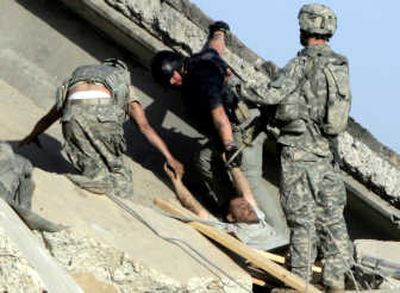Security contractors feel the heat of battle

BAGHDAD – Private security companies, funded by billions of dollars in U.S. military and State Department contracts, are fighting insurgents on a widening scale in Iraq, enduring daily attacks, returning fire and taking hundreds of casualties that have been underreported and sometimes concealed, according to U.S. and Iraqi officials and company representatives.
While the military builds up troops in an ongoing campaign to secure Baghdad, the security companies, out of public view, are engaged in a parallel surge, boosting manpower, adding expensive armor and stepping up evasive action as attacks increase, the officials and company representatives said. One in seven supply convoys protected by private forces has come under attack this year, according to previously unreleased statistics; one security company reported nearly 300 “hostile actions” in the first four months.
The majority of the more than 100 security companies operate outside of Iraqi law, in part because of bureaucratic delays and corruption in the Iraqi government licensing process, according to U.S. officials. Blackwater USA, a prominent North Carolina firm that protects U.S. Ambassador Ryan C. Crocker, and several other companies have not applied, U.S. and Iraqi officials said. Blackwater said that it obtained a one-year license in 2005 but that shifting Iraqi government policy has impeded its attempts to renew.
The security industry’s enormous growth has been facilitated by the U.S. military, which uses the 20,000 to 30,000 contractors to offset chronic troop shortages. Armed contractors protect all convoys transporting reconstruction materiel, including vehicles, weapons and ammunition for the Iraqi army and police. They guard key U.S. military installations and provide personal security for at least three commanding generals, including Air Force Maj. Gen. Darryl A. Scott, who oversees U.S. military contracting in Iraq and Afghanistan.
“I’m kind of practicing what I preach here,” Scott said about the use of private security forces for such tasks. “I’m a two-star general, but I’m not the most important guy in the multinational force. If it’s a lower-priority mission, and it’s within the capabilities of private security, this is an appropriate risk trade-off.”
The military plans to outsource at least $1.5 billion in security operations this year, including the three largest security contracts in Iraq: a “theaterwide” contract to protect U.S. bases that is worth up to $480 million, according to Scott; a contract for up to $475 million to provide intelligence for the Army and personal security for the U.S. Army Corps of Engineers; and a contract for up to $450 million to protect reconstruction convoys. The Army has also tested a plan to use private security on military convoys for the first time, a shift that would significantly increase the presence of armed contractors on Iraq’s dangerous roads.
“The whole face of private security changed with Iraq, and it will never go back to how it was,” said Leon Sharon, a retired Special Operations officer who commands 500 private Kurdish guards at an immense warehouse transit point for weapons, ammunition and other materiel on the outskirts of Baghdad.
U.S. officials and security company representatives emphasized that contractors are strictly limited to defensive operations. But company representatives in the field said insurgents rarely distinguish between the military and private forces, drawing the contractors into a bloody and escalating campaign.
The U.S. military has never released complete statistics on contractor casualties or the number of attacks on privately guarded convoys. The military deleted casualty figures from reports issued by the Reconstruction Logistics Directorate of the Corps of Engineers, according to Victoria Wayne, who served as deputy director for logistics until 2006 and spent 2 1/2 years in Iraq.
Wayne described security contractors as “the unsung heroes of the war.” She said she believed the military wanted to hide information showing that private guards were fighting and dying in large numbers because it would be perceived as bad news.
“It was like there was a major war being fought out there, but we were the only ones who knew about it,” Wayne said.
After a year of protests by Wayne and logistics director Jack Holly, a retired Marine colonel, the casualty figures were included. In an operational overview updated last month, the logistics directorate reported that 132 security contractors and truck drivers had been killed and 416 wounded since fall 2004. Four security contractors and a truck driver remained missing, and 208 vehicles were destroyed. Only convoys registered with the logistics directorate are counted in the statistics, and the total number of casualties is believed to be higher.
“When you see the number of my people who have been killed, the American public should recognize that every one of them represents an American soldier or Marine or sailor who didn’t have to go in harm’s way,” Holly said in an interview.